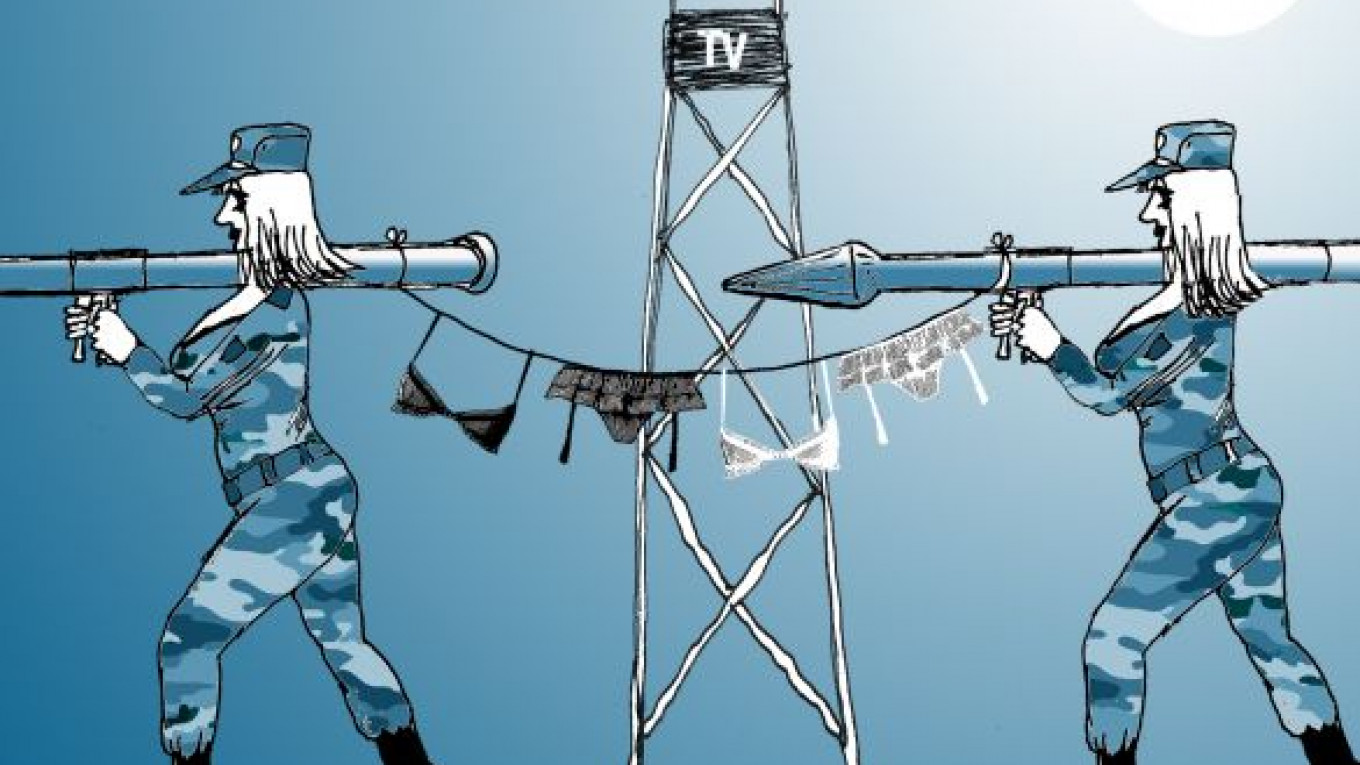This week, Channel One started a new show called "Special Assignment," where famous people have to put on khakis and join the Russian army for six weeks.
The show's brilliant trailers had Russian tanks waltzing in synch on sand, which looked like a satire on modern warfare — until the waltzing stopped and our lovely hosts, the blonde Vera Brezhneva and the muscly Oleg Taktarov, climbed out of the hatches.
The idea of the show is that two teams get immersed in the action by living in real barracks, under the command of real officers, and compete with one another in silly games until the best team wins. It is sponsored by the Defense Ministry, which apparently believes that it will help recruit more soldiers.
The conditions are "comparable to the real army life of a conscript soldier in the armed forces of the Russian Federation," Taktarov tells contestants.
There's definitely an aim of promoting the army, with fact boxes telling us how the contestants are wearing the new modern uniform, not the recently abolished breeches and foot rags.
It's the latest in a long line of endurance reality shows, such as "Survivor," which had competitors eating worms on a jungly shore, and "Fort Boyard," where players wearing hideous Lycra outfits have to negotiate giant rubber hammers and avoid slipping into water-filled pools.
The show lasts six weeks, during which time the contestants allegedly go through the whole course of a "young warrior" that a conscript would experience. The final four contestants have to decide who is the overall winner.
The show has a portentous voice-over, with the announcer constantly saying things like: "They will never return to their previous lives."
The contestants included a blonde model called Yelena Kuletskaya, 28, former girlfriend of Eurovision winner Dima Bilan. Willowy and self-possessed, she spoke in an unusually low-pitched voice. "There's no mirror in the barracks," she said in horror.
Another familiar face was Avraam Russo, the Syrian-born pop singer who fled Russia in 2006 after he was shot in his moving car in central Moscow and seriously injured. Oddly enough, that did not dissuade Russo from pursuing an appearance in a reality show bristling with guns.
All the same, I was relieved when Russo was disqualified from the first round after walking, not jogging, to the base with his dodgy leg, and arriving last.
There are also some oddballs such as a woman called Miriam, whose qualification seems to be that she once served in the Israeli army — and can drive a tank — but who was clearly struggling to keep up in a totally unsuitable dress.
Somewhat unfairly, there are also a number of professional sportsmen: Vitaly Minakov, a wrestling world champion, Viktor Maigurov, a biathlete, and Batu Khasikov, a kickboxing world champion. And typically, they all seemed to end up on one team.
"The main thing is you have to conquer yourself," Khasikov intones wisely, while the other team comforts itself that "the public will support us. We have more girls and intelligentsia."
The real work is done by the show's two officers: Captain Alexander Kolbanov, a paratrooper, and Lieutenant-Colonel Vladimir Podolyansky, whose job is to herd the teams into the right places and teach them to stop smiling, hold their chins up and shout, "Tak tochno," the army way of saying "Yes." They spend three hours a day schooling the recalcitrant celebrities on the parade ground.
"I'm small, skinny and ugly, but you have no idea what I'm capable of," said Podolyansky, who has a favorite catchphrase: "The punishment will be cruel."
"They've not come to a pioneer camp," he said firmly.
A Message from The Moscow Times:
Dear readers,
We are facing unprecedented challenges. Russia's Prosecutor General's Office has designated The Moscow Times as an "undesirable" organization, criminalizing our work and putting our staff at risk of prosecution. This follows our earlier unjust labeling as a "foreign agent."
These actions are direct attempts to silence independent journalism in Russia. The authorities claim our work "discredits the decisions of the Russian leadership." We see things differently: we strive to provide accurate, unbiased reporting on Russia.
We, the journalists of The Moscow Times, refuse to be silenced. But to continue our work, we need your help.
Your support, no matter how small, makes a world of difference. If you can, please support us monthly starting from just $2. It's quick to set up, and every contribution makes a significant impact.
By supporting The Moscow Times, you're defending open, independent journalism in the face of repression. Thank you for standing with us.
Remind me later.






